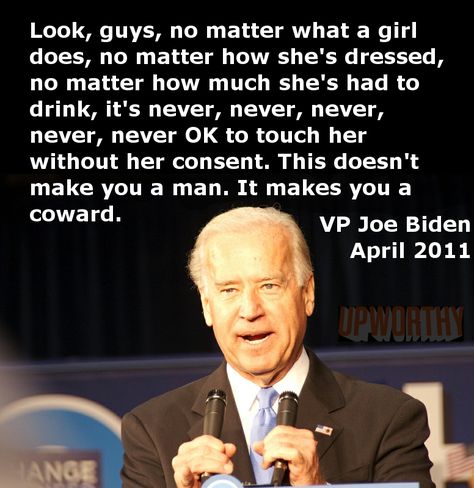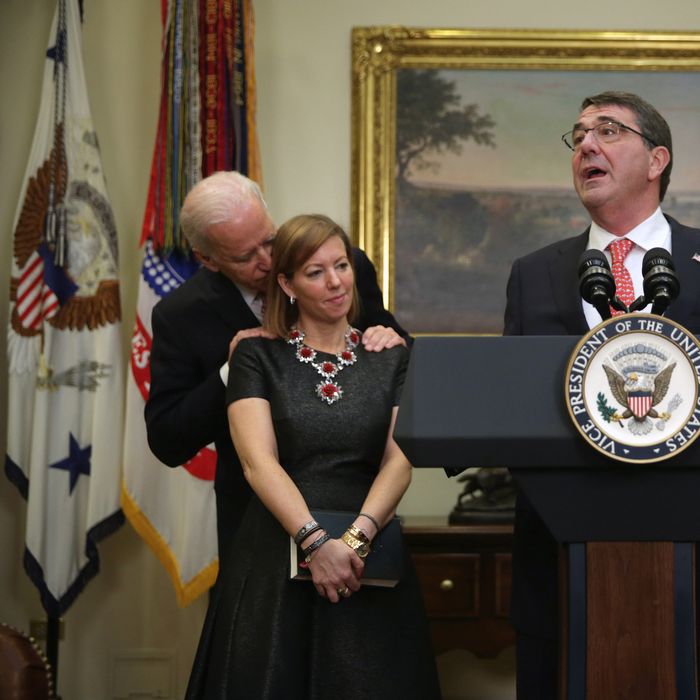
Joe Biden’s history of unwanted touching threatens to put off women voters
- By Michael Finnegan and Melanie Mason
Los Angeles Times - Mar 30, 2019 Updated 25 min ago
An allegation that Joe Bideninappropriately touched a Nevada state lawmaker is renewing questions about his appeal to women if he seeks the Democratic presidential nomination.
The former vice president’s decades of vacillation on abortion rights and his handling of Anita Hill’s sexual harassment allegations against Clarence Thomas at Supreme Court confirmation hearings in 1991 were already serious vulnerabilities.
If Biden launches his third campaign for president, as expected, he will be joining a crowded field of Democratic rivals that includes four women in the U.S. Senate — and at a time when women have been siding strongly with Democrats in national elections.
Beyond the primaries, the new accusation raises questions about whether Biden, in a general-election contest, would strike a weak contrast with President Donald Trump, who has faced multiple allegations of sexual misconduct toward women.
The 2020 presidential race is the first to occur after the explosion of the #MeToomovement, which swept record numbers of women into public office last year. Over the last 18 months, numerous powerful men in media, politics and business have lost their jobs or careers after allegations of sexual harassment or assault became public.
“Running a campaign in the post-#MeToo, or in the middle of the #MeToo movement, with these kinds of things on your record is going to be very difficult,” said Princeton University historian Julian Zelizer. “The old ways on gender are just no longer tolerable.”
In a New York Magazine web post on Friday, former Nevada Assemblywoman Lucy Flores wrote that she felt demeaned and disrespected when Biden touched her offstage at a 2014 campaign rally. She said she felt Biden’s hands on her shoulders and froze.
“He leaned further in and inhaled my hair,” she wrote. “I was mortified.”
Flores, then a 35-year-old candidate for lieutenant governor, wondered why the vice president was smelling her hair.
“He proceeded to plant a big slow kiss on the back of my head,” she said. “My brain couldn’t process what was happening. I was embarrassed. I was shocked. I was confused.”
Flores said he made her feel gross, and she “wanted nothing more than to get Biden away from me.”
Neither Biden, 76, nor his staff recall the incident that Flores described, spokesman Bill Russo said.
“But Vice President Biden believes that Ms. Flores has every right to share her own recollection and reflections, and that it is a change for better in our society that she has the opportunity to do so,” Russo said.
People who know Biden best, he added, “are speaking up to say that he has always been a champion for women in his office.”
Biden, who co-sponsored the 1994 Violence Against Women Act, has long had a reputation as an affable politician who is quick to smile and put his hands on people. One viral video from 2013 captured how Biden, then vice president, “works the room” while swearing in senators — wrapping their mothers in tight embraces, insisting that female family members stand next to him, even stroking the face of one.
The behavior fed into Biden’s folksy “Uncle Joe” image, epitomized in an Onion satire that envisioned a shirtless vice president fixing a vintage Trans Am on the White House grounds while making mild catcalls.
But in another light, Biden’s behavior struck some as disturbing. At a Senate swearing-in ceremony in 2015, Biden whispered in the ear of a senator’s teenage daughter and kissed the side of her head, an interaction that a conservative writer described as a “lecherous elderly man creeping on underage girl” and said Biden would’ve caught more flak if he were a Republican.
“All of us who have been around Joe Biden — he hugs men, women and children,” said Dick Harpootlian, a South Carolina state senator and avid Biden supporter.
“He is a hugger. That’s just the generation he comes from, and that’s his personality. You shouldn’t read anything into it other than he was doing what he has done to me, to my daughter, to my wife, to Barack Obama.”
If Biden made Flores feel uncomfortable, he said, it was unintended.
(EDITORS: BEGIN OPTIONAL TRIM)
Mindy Romero, a political sociologist at the University of Southern California, said the effect of Flores’ allegation will depend partly on whether Biden’s rivals — especially the women — try to use it against him.
(END OPTIONAL TRIM)
“If they do, that will elevate it,” she said.
Two of the Democratic contenders campaigning in Iowa on Saturday, U.S. Sen. Elizabeth Warren of Massachusetts and former Housing Secretary Julian Castro, told reporters they believe Flores.
“Joe Biden needs to give an answer,” Warren said.
A key Biden supporter said there was no panic among his top advisers, and the Flores allegation would likely not change his expected plan to join the presidential contest in April.
Another longtime Biden ally, former Pennsylvania Gov. Ed Rendell, said the Flores story was “obviously a hurdle” but would do no harm to his campaign, even in a general-election contest against Trump.
“Jack the Ripper wouldn’t have a problem with his sexual activity compared to President Trump,” Rendell said.
Ana Navarro-Cardenas, the Republican strategist and commentator, wrote on Twitter that Biden needs to stop the “touchy-feely” conduct that makes people uncomfortable.
“But pls get back to me when +15 women say he sexually harassed them, or he boasts of grabbing a woman’s kitty-cat, or he pays hush-money to a stripper who reminds him of his daughter,” she wrote. “I’ll wait.”
If he runs, Biden’s mixed record on abortion in his 36 years as a U.S. senator from Delaware will pose no small challenge as he seeks to build support among Democratic women. Biden, who is Catholic, voted to restrict and expand abortion rights over the course of his career.
In a 1974 interview with the Washingtonian, Biden criticized the Supreme Court’s Roe v. Wade ruling that legalized abortion nationwide. “I think it went too far,” he said. “I don’t think that a woman has the sole right to say what should happen to her body.”
In the Senate, he voted in 1982 for a proposed constitutional amendment that would have effectively overturned Roe v. Wade by giving states the right to outlaw abortion. And he voted to ban federal funding of abortions.
By the time he ran for president in 2008, Biden was vowing to protect Roe v. Wade, and he’d built a voting record largely supporting abortion rights. But he also voted to ban certain late-term abortions.
What has caused Biden the most political trouble with women has been his leadership of the Senate Judiciary Committee during the Thomas hearings. Hill’s calmly delivered allegations that Thomas sexually harassed her were met with aggressive and embarrassing questions by the all-male committee, and witnesses who were prepared to testify on her behalf were not allowed to appear.
“Anyone who lived through the 1990s remembers his role in that, and it wasn’t favorable,” said Zelizer, the Princeton historian.
(EDITORS: STORY CAN END HERE)
In a tacit recognition of the enduring political damage, Biden told a New York audience Tuesday: “To this day, I regret I couldn’t come up with a way to give her the kind of hearing she deserved.”
Critics continue to fault Biden for not apologizing personally to Hill. Even longtime allies like Christine Pelosi, chair of the Women’s Caucus of the California Democratic Party, say he needs to use his diplomatic skills to address the problem.
“Call Anita Hill,” Pelosi said. “Call Lucy Flores. Call the people you need to call.”
In her post, Flores suggested “there should be zero tolerance for a man who persistently invades others’ personal space and makes people feel uneasy and gross.”
“In this case,” she said, “it shows a lack of empathy for the women and young girls whose space he is invading, and ignores the power imbalance that exists between Biden and the women he chooses to get cozy with.”











